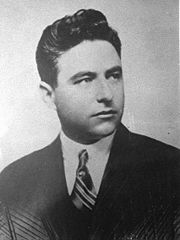
Konstantin Muraviev
Encyclopedia

Pazardzhik
Pazardzhik is a city situated along the banks of the Maritsa river, Southern Bulgaria. It is the capital of Pazardzhik Province and centre for the homonymous Pazardzhik Municipality...
– 31 January 1965) was a leading member of the Agrarian People's Union
Bulgarian Agrarian People's Union
Bulgarian Agrarian National Union also tiranslated to English as Bulgarian Agrarian People's Union is a political party devoted to representing the causes of the Bulgarian peasantry. It was most powerful between 1900 and 1923. In practice, it was an agrarian movement...
who briefly served as Prime Minister of Bulgaria near the end of Bulgaria
Bulgaria
Bulgaria , officially the Republic of Bulgaria , is a parliamentary democracy within a unitary constitutional republic in Southeast Europe. The country borders Romania to the north, Serbia and Macedonia to the west, Greece and Turkey to the south, as well as the Black Sea to the east...
n involvement in the Second World War. Muraviev was educated at Robert College
Robert College
Robert College of Istanbul , is one of the most selective independent private high schools in Turkey. Robert College is a co-educational, boarding school with a wooded campus on the European side of Istanbul between the two bridges on the Bosphorus, with the Arnavutköy district to the east, and...
of Istanbul
Istanbul
Istanbul , historically known as Byzantium and Constantinople , is the largest city of Turkey. Istanbul metropolitan province had 13.26 million people living in it as of December, 2010, which is 18% of Turkey's population and the 3rd largest metropolitan area in Europe after London and...
, just like Ivan Evstratiev Geshov
Ivan Evstratiev Geshov
Ivan Evstratiev Geshov was a Bulgarian politician who served as Prime Minister.Born in Plovdiv to a family originally from Karlovo, Geshov was educated at various Greek and Protestant institutions, as well as Owens College in Manchester...
, Todor Ivanchov
Todor Ivanchov
Todor Ivanchov was a supporter of Vasil Radoslavov who served as Prime Minister of Bulgaria from 13 October 1899 to 25 January 1901.Born in Veliko Tarnovo, he was educated at Robert College and in Montpellier, specializing in economics...
, Konstantin Stoilov
Konstantin Stoilov
Konstantin Stoilov was a leading Bulgarian politician and twice Prime Minister. Simeon Radev described him as the most European-like of all Bulgarian politicians....
and many other Bulgarian revolutionaries were.
The nephew of Aleksandar Stamboliyski
Aleksandar Stamboliyski
Aleksandar Stamboliyski was the prime minister of Bulgaria from 1919 until 1923. Stamboliyski was a member of the Agrarian Union, an agrarian peasant movement which was not allied to the monarchy, and edited their newspaper...
, he was chosen to appeal to the Western Allies
Allies of World War II
The Allies of World War II were the countries that opposed the Axis powers during the Second World War . Former Axis states contributing to the Allied victory are not considered Allied states...
after they had rejected the advances of his predecessor Ivan Ivanov Bagryanov. Muraviev ratified the abolition of all laws against Jews on 5 September and on the 8th he declared war on Nazi Germany
Nazi Germany
Nazi Germany , also known as the Third Reich , but officially called German Reich from 1933 to 1943 and Greater German Reich from 26 June 1943 onward, is the name commonly used to refer to the state of Germany from 1933 to 1945, when it was a totalitarian dictatorship ruled by...
. However, his efforts were a failure as, after little more than a week in the job, his government was overthrown by the Fatherland Front
Fatherland Front (Bulgaria)
The Fatherland Front was originally a Bulgarian political resistance movement during World War II. The Zveno movement, the communist Bulgarian Workers Party, a wing of the Agrarian Union and the Bulgarian Social Democratic Workers Party, were all part of the FF...
coup of 9 September 1944 as the Red Army
Red Army
The Workers' and Peasants' Red Army started out as the Soviet Union's revolutionary communist combat groups during the Russian Civil War of 1918-1922. It grew into the national army of the Soviet Union. By the 1930s the Red Army was among the largest armies in history.The "Red Army" name refers to...
advanced into the country.
Unlike many of his contemporaries, Muraviev escaped execution after the war and published a book on Bulgarian politics, Sŭbitiya i khora (Събития и хора), in 1963.

